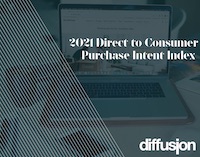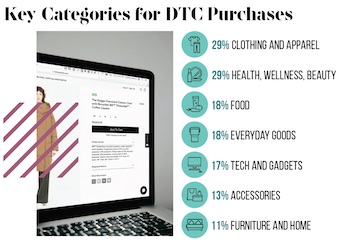 |
Direct-to-market brands are already big, and over the next five years they are likely to get even bigger, adding another headache for traditional retailers slammed by COVID-19 and the dominant presence of online shopping, according to a new study from Diffusion.
Conducted in partnership with research firm YouGov, Diffusion’s 2021 DTC Purchase Intent Index found that more than two out of five respondents were familiar with a DTC brand, and 69 percent of those who knew about DTC brands had made at least one DTC purchase in the past year.
While only four percent said that they made 80 to 100 percent of their purchases from DTC brands, 45 percent said they bought from DTC brands 20 percent or more of the time.
 |
According to the survey, those numbers are heading up. In the coming year, 79 percent of respondents familiar with DTC brands plan to increase the number of purchases they make, with six percent intending to make 80 to 100 percent of their purchases from DTC brands and 52 percent saying they will turn to DTC for 20 percent or more of their purchasing.
The most popular items for DTC shopping are clothing & apparel, and health, wellness & beauty, with 29 percent saying that had made purchases from at least one of those. Food (18 percent), everyday goods (18 percent) and tech & gadgets (17 percent) also showed considerable strength.
When it comes to the reasons why consumers opt for DTC brands, more than four in ten (44 percent) say that they perceive those brands as being produced at higher quality and lower cost, with 38 percent liking the idea that DTC brands are primarily e-commerce driven.
But retail is not totally out of the running. Over a third of those familiar with DTC brands (36 percent) say that convenience and being to have the product the same day would sway them toward traditional retail. Almost as many (35 percent) said that fast, free shipping could move the needle toward retail, and 32 percent said that they liked staying with a retail brand they already trust.
In addition, DTC is seen as having its own drawbacks. 35 percent said that not being able to physically examine items was a downside, 27 percent wanted to avoid the hassle of returning a product via shipping and 21 percent fear that they are buying into a social media or Instagram scam.
DTC brands also received points if they exhibited social responsibility, with 31 percent of respondents saying they would purchase from brands that have demonstrated support for social and environmental issues, and 15 percent giving high marks to sustainable brands.
The Diffusion/YouGov survey was conducted from Sept. 26 to 28. To see the entire study, click here.


 Consumers who once demanded convenience now require consistent, multi-channel experiences that cater to them at every point. Brands must have a clear, audience-appropriate, and channel-specific voice across all platforms.
Consumers who once demanded convenience now require consistent, multi-channel experiences that cater to them at every point. Brands must have a clear, audience-appropriate, and channel-specific voice across all platforms. Employees at U.S. companies are experiencing high levels of burnout, but managers are lagging behind when it comes to their awareness of the problem
Employees at U.S. companies are experiencing high levels of burnout, but managers are lagging behind when it comes to their awareness of the problem Brand has a powerful effect on a company’s valuation, but the level of brand understanding in the investment community leaves a lot to be desired, according to a new study from Brodeur Partners, Interbrand and NewtonX.
Brand has a powerful effect on a company’s valuation, but the level of brand understanding in the investment community leaves a lot to be desired, according to a new study from Brodeur Partners, Interbrand and NewtonX. AI may still be viewed with a wary eye by most media pros, but its use is growing, according to a new study from Muck Rack.
AI may still be viewed with a wary eye by most media pros, but its use is growing, according to a new study from Muck Rack. A new study from Walker Sands says that some marketers have been putting the cart before the horse when it comes to the relationship between marketing channels and business outcomes.
A new study from Walker Sands says that some marketers have been putting the cart before the horse when it comes to the relationship between marketing channels and business outcomes.


 Have a comment? Send it to
Have a comment? Send it to 
No comments have been submitted for this story yet.